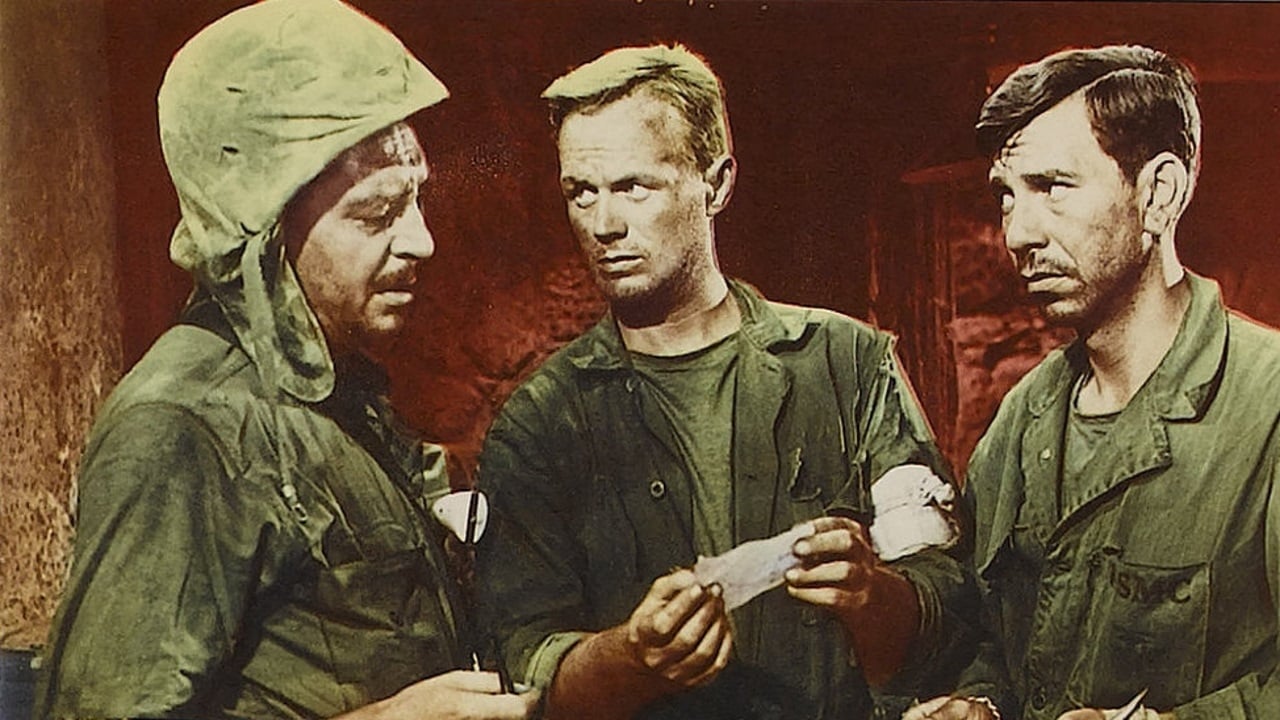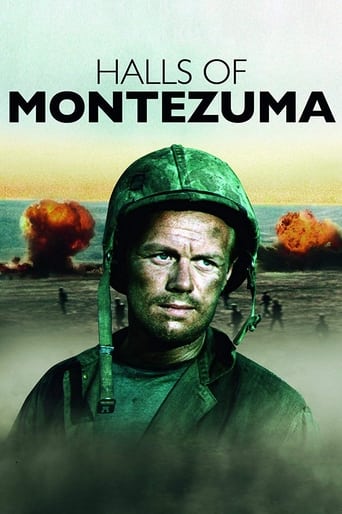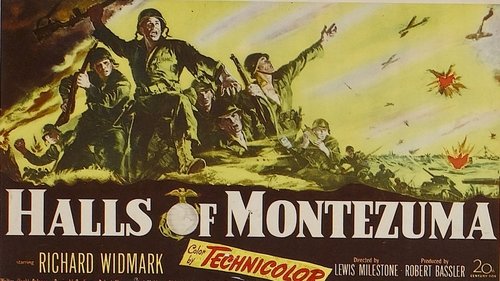Perry Kate
Very very predictable, including the post credit scene !!!
Myron Clemons
A film of deceptively outspoken contemporary relevance, this is cinema at its most alert, alarming and alive.
Quiet Muffin
This movie tries so hard to be funny, yet it falls flat every time. Just another example of recycled ideas repackaged with women in an attempt to appeal to a certain audience.
Lela
The tone of this movie is interesting -- the stakes are both dramatic and high, but it's balanced with a lot of fun, tongue and cheek dialogue.
Spikeopath
U.S. Marines battle to take control of a Japanese held island in the Pacific…Directed by Lewis Milestone, Halls of Montezuma is unabashed in its flag waving paean to the U.S. Marines. With a strong ensemble cast to act out the play, Milestone inter-cuts real war footage with skilled recreations of the guts and glory mission undertaken by the men.Film is very keen to let us know what sort of men are fighting this war, keeping the characterisations intimate, it's a roll call of the brave, the stupid, the scared and the insane. Flashbacks help fill in the gaps of the men's psychological make ups, and the futility of war message is deftly handled by the astute director.Colour photography is glossy and impressive, even if it strips away some of the grittiness the story needs to thrive on, and the musical score is kept to a minimum and suitably deals in plays on army anthems. All told it's a thoroughly engrossing and potent war movie and highly recommended to fans of such fare. 7.5/10
Lechuguilla
Arguably, it's one of the three or four best WWII movies ever made. A group of U.S. Marines race against the clock to find the source of enemy rockets that prevent them from taking control of a Japanese-held Pacific island. It's certainly a patriotic film. But there is also an undercurrent of despair, based on the human toll that war inevitably takes.These Leathernecks are tough, but they are also subject to death from enemy fire. And the screen story puts a lot of emphasis on individual characterization. I don't recall a film that did such a good job of combining scene transitions with flashbacks to help viewers understand the motivations of the main characters.Lt. Anderson (Richard Widmark) is the leader; he suffers from debilitating migraine headaches, but nevertheless pushes on to fulfill whatever dangerous mission he's assigned. One of his men is Conroy (Richard Hylton) who used to stutter, until Anderson helped cure him of it years earlier. Slattery (Bert Freed) is your typical Marine toughie, but he's got a sense of humor and conceals a portable still to make booze. Pretty Boy (Skip Homeier) is a pistol packing dude with a chip on his shoulder. Through the screen story's deep characterizations, viewers naturally become attached to these guys, and root for them as they enter into their dangerous mission. Of the dozen or so men Anderson leads, not all will make it out alive.As in other battle films, viewers learn the importance of quick decisions, teamwork, effective communication, and keen awareness of one's surroundings. Life occurs moment by moment, in the here and now. Make a plan; execute it; dodge a problem; ignore pain and fatigue; persist. These are lessons applicable to anyone at any time, not just warriors on the battlefield."Halls Of Montezuma" is a quality production all the way. The color cinematography is fine, despite the fact that some of the techniques are dated. The ensemble acting is credible. The editing and scene transitions are just terrific. And, as the film's bookends, that rousing theme song: "From the halls of Montezuma to the shores of Tripoli" gets the viewer in the right frame of mind.I normally don't care for movies in this genre. Even this film, like other WWII films, is a tad too predictable, slightly manipulative, and contains some outdated assumptions. Nevertheless, as war movies go, "Halls Of Montezuma" is one of the best.
Robert J. Maxwell
I don't know exactly why this film gets as much applause as it does from reviewers. It's not bad, it's just unexceptional, even for 1950.A DUKW delivers a platoon of Marines to an unnamed Pacific Island. As the ungainly craft drones slowly shoreward we get to know a little -- a very little -- about a handful of the men. Sometimes there is a voice-over to help us out. ("What am I doing here? I should be back on my farm. Cows don't cause trouble.") Sometimes there's a visual flashback to spell out the more complicated backgrounds, but the flashbacks don't last long, and they don't tell us much.Nobody has more than one dimension. For instance, Jack Palance and Skip ("Prettyboy") Homeier are good friends. (Maybe what we used to call "******* buddies".) Homeier is going to be boxer Palance's manager after the war. Homeier comes from a crummy background and wants to be a big man, someday. And that's that, except that one dies trying to save the other.Slattery is a beefy unthinking slob who wants nothing more than to build a still and make whiskey. He eyes a discarded samurai sword and mutters, "That'd be worth a pretty drop." And that's it for Slattery.Another guy used to stutter but, with Lt. Richard Widmark's help, he overcomes it along with his fear of combat. So much for him.Every man carries some sort of demon with him going ashore, and he either overcomes it or dies trying. Of the half dozen or so men we get to know something about, one by one half of them are picked off so the remainder can grieve in their varying ways. The personal stories seem patched together by a platoon of orthodox screenwriters.The engine that moves the plot is that the Marine's advance has been stalled by an unexpected hail of rockets. Nobody can figure out where they're coming from. The Navy plasters the forward slopes of the ridge ahead. No dice. They plaster the reverse slopes. No good either. They plaster a nearby sugar cane field. Everything is plastered, except Slattery."Do you not remember," philosophizes an English-speaking Japanese prisoner, "that we Japanese always take the obvious and do the reverse." Light bulbs go off and an epiphany occurs. It means that the Japanese have actually built tunnels inside the ridge and placed the openings for the rocket-firing apparatus in the forward slopes of the ridge ahead.Actually, I kind of enjoyed it. It's ridden with clichés and the script really isn't innovative but there's plenty of action, and Lewis Milestone has directed with his usual aplomb. He uses several long pans of men charging and falling, which dates back to his "A Walk in the Sun," and before that to "All Quiet on the Western Front." The performances don't hurt either. Richard Widmark, as the officer who suffers migraines and is dependent on analgesics, isn't bad. Sometimes, when the scene calls for it, he can look positively pained. Jack Palance doesn't have much of a part as the would-be boxer but it's hard to ignore him when he's on screen. Richard Boone, at that age, before wasted by booze, looked more like Scott Glenn than I'd ever noticed before, at least from certain angles.
Nazi_Fighter_David
The hate content in war films which had up to this point been reserved mainly for the Germans was now temporarily re-channeled in the direction of the Japanese, and the Pacific War was revived in aggressive patriotism in films like Allan Dwan's "Sands of Iwo Jima," Fritz Lang's "I Shall Return, " Nicolas Ray's "Flying Leathernecks," and Lewis Milestone's "Hall of Montezuma." The focus of Milestone's film is the capture of a site on which the enemy have set up rocket sites… A Marine patrol is sent out, with orders to take prisoners and bring them back for interrogation… Much of the movie's appeal arises from its future ensemble cast… There is Richard Widmark, a former schoolteacher who fights the war with his head in a vice; Karl Malden, the medical corpsman who knows what psychological migraine is; Reginald Gardiner, the British-born sergeant, who can speak Japanese; Robert Wagner, the young radio man who kept pestering his fellow soldiers; Skip Homeier, the hotshot 'pretty boy' who is in a hurry to get home; Jack Palance, the protective and grateful boxer who wants his pal as his future manager; Richard Hylton, the student who handled fear once; Richard Boone, the desperate colonel who insists on taking prisoners; Neville Brand, the strong sergeant blinded during a bomb attack; and Bert Freed, the best fighter man but before and after "the no-good money burnin', gin-drinkin' horsehead…" All the characters solved their hang-ups with bouts of heroism, and Widmark was on hand to lead the last attack with a rousing battle-cry "Give 'em hell!"


